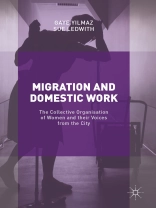With female migrants dominating low paid and ever-expanding domestic work worldwide, this book brings together the voices of 120 migrating women of 28 national identities and 10 different religious affiliations. Together they tell how patriarchal and religious gender codes in the family and at work shape their new lives in London, Berlin and Istanbul. Through their own accounts, the study explores the intersecting multiple and gendered identities women carry from their home countries and how these are reshaped, challenged, changed, or not, as they encounter different structures, traditions and cultural codes in their new countries. With women’s propensity for collective organising, whether via community, social movements or trade unions as a central theme, the authors also bring together issues of migration, work and identity with trade union and community organizing. Migration and Domestic Work is an important source for scholars and practitioners in each of these fields.
Tabla de materias
Chapter 1. Migrating Women and Domestic Work: Starting Our Exploration.- Chapter 2. Women Migrating to London, Berlin, Istanbul – A Research Study.- Chapter 3. Dreams Dashed but Not Forgotten.- Chapter 4. Migrating Women’s Working Lives, Rights and Social Protections.- Chapter 5. Identity, Belonging, Discrimination, Racism, Sexism and Exclusion.- Chapter 6. Gender, Family and Religion.- Chapter 7. Family and Gender, Religion and Work.- Chapter 8. Migrant Women’s Collectivism: The Diaspora and Community Organising.- Chapter 9. Migrant Women, Collectivism, and Trade Unions.- Chapter 10. Prospects for Women Migrant Domestic Workers.
Sobre el autor
Gaye Yilmaz is a scholar in the Faculty of Educational Sciences at Bogazici University, Istanbul, Turkey. While her academic work focuses on political economy she has also actively taken part in the struggles of vulnerable groups such as Kurds, workers, women and LGBTI. She worked for Turkish labour unions between 1996 and 2008. She was also one of 1128 academics who signed a petition urging the government to make peace with the Kurdish people.
Sue Ledwith is Emerita Scholar in International Labour and Trade Union Studies, Ruskin College, Oxford, UK. Also an activist, Sue has researched and published in the field of gender democracy and labour movements for 25 years, recently re-addressing this work as a longitudinal, international study in her Ph D “Prospects for Gender Democracy in Labour Movements”.












